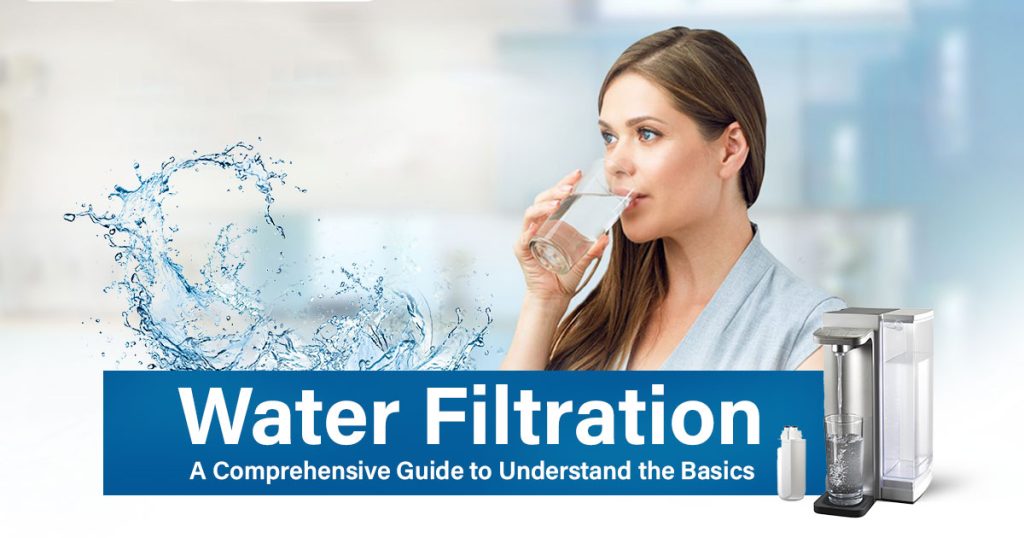Water filtration is the process of removing impurities, chemicals, and harmful substances from water to make it safe for daily use. It works through physical barriers, chemical reactions, or biological processes that trap or neutralize contaminants. Clean water supports health, enhances the taste of food, and protects against exposure to pollutants.
The importance of water filtration lies in its ability to protect households from contaminants found in tap or well water. Chlorine, lead, pesticides, and bacteria are common in unfiltered water. Exposure to these substances increases the risk of health problems. Filtration systems provide a reliable means of safeguarding families by ensuring safe and consistent access to clean water. They also help protect appliances and plumbing systems by reducing sediment buildup and corrosion, extending their lifespan.
Understanding water filtration is the first step for anyone who wants safer water at home. People turn to these systems to add taste, reduce the risk of contaminants, and experience long-term cost savings compared to bottled water. An educated understanding of the basics enables an informed choice about the type of system that best suits their water quality, lifestyle, and budget. Water filtration is not only a health measure but also an investment in sustainability and long-term well-being.
What is the Basic Principle of Filtration?
The basic principle of filtration is separating impurities from water by passing it through a medium that blocks or neutralizes unwanted substances. Depending on the technique, the medium might be a physical barrier, a chemical coating such as activated carbon, or a biological coating aiming to eliminate injurious microbes. It eliminates contaminants such as dirt, chlorine compounds, pesticides, heavy metals, and bacteria, while allowing clean water to pass through for hazard-free use.
Water filtration is critical because it ensures health protection, maintains home systems, and promotes sustainability. Freshwater decreases water-borne disease risk and poison exposure. It also inhibits the accumulation of sediment in pipelines and appliances, thereby increasing their longevity. By reducing bottled water use, filtration helps cut down plastic waste and contributes to environmental protection.
Why does Water Filtration Matter in Our Daily Lives?
Water filtration is essential in our daily lives because it removes harmful substances, keeps households safe from illness, enhances the taste of water, and protects plumbing systems. It also reduces reliance on bottled water, cutting costs and plastic waste.
The main factors that show why filtration matters in our daily lives are:
- Removes contaminants
Water filtration is also important to remove unwanted contaminants, including pollutants like chlorine, lead, pesticides, and bacteria. Without filtration, homes become vulnerable to harmful chemicals and contaminants that could be harmful to anyone’s health. A high-quality filtration system ensures access to hygienic and safe water, free from contaminants, suitable for everyday use such as drinking, cooking, and personal hygiene.
- Prevents illnesses
Raw water contains microorganisms, including bacteria, viruses, and parasites, that cause diseases. Dirty water is linked to stomach infections, diarrhea, and chronic diseases. Filtration prevents such pathogens from passing through, minimizing hazards and providing homes with reliable access to safe water that promotes health and protection.
- Improves taste
Chlorine, dirt, and minerals found in kitchen water alter its taste and smell, thereby deterring frequent usage. A filtering process removes these substances, resulting in cleaner, fresher water. Better-tasting water encourages proper hydration, supports cooking needs, and enhances the taste of beverages like tea and coffee.
- Protects plumbing
Sediment, rust, and minerals in unfiltered water accumulate inside pipes and appliances. This buildup shortens the lifespan of heaters, dishwashers, and washing machines. Water filtration reduces sediment flow, protecting plumbing systems, minimizing costly repairs, and extending the efficiency and durability of household equipment.
- Reduces plastic
Filtered water reduces dependency on bottled water, lowering household expenses and plastic consumption. A single filtration system replaces hundreds of disposable bottles. This helps limit plastic waste in landfills and oceans, supporting both environmental conservation and long-term consumer savings in daily life.
What Are the Best Uses of Water Filtration?
The best uses of water filtration in industry are to ensure safe processing, protect critical equipment, and maintain consistent product quality. It removes impurities and supports compliance with safety and efficiency standards.
The best uses of water filtration are:
- Removes contaminants
Filtration eliminates contaminants such as dirt, chlorine, and microbes. Pure water saves homes as well as industries from pollution dangers. It ensures healthier drinking, healthier cooking, and healthier production, all while maintaining compliance with health and safety standards.
- Ensures quality
Water quality has a significant impact on reliability, safety, and quality. Filtration increases water quality by removing harmful contaminants that could compromise health or the quality and integrity of a product. Safe, high-quality water also generates consumer confidence as much as regulatory compliance.
- Supports industries
Industries rely on potable water to manufacture products, generate energy, and facilitate chemical reactions. Filtration promotes system steadiness and effective production. It eliminates or minimizes downtime and ensures operations meet the necessary safety and quality standards.
- Protects equipment
Raw water causes damage to boilers, cooling towers, and pipes due to the formation of scale and corrosion. Filtration prevents such issues by removing contaminants and harmful minerals. Filtration extends the life of equipment alongside reduced maintenance and replacement expenditure.
- Improves efficiency
Filtered water enhances system efficiency by reducing breakdowns and energy consumption. Efficiently running systems increases production and decreases the costs associated with operating a system. Filtration contributes directly to increased output with low stoppages.
- Enhances products
Water quality influences the taste, safety, and effectiveness of final products. Filtration enhances industrial products by providing cleaner water for production. This ensures compliance with standards and strengthens consumer confidence in product safety and performance.
- Prevents damage
Dirty water damages storage tanks and machines. Filtration averts such issues by eliminating corrosive contaminants from entering machines. Companies reduce expenditures, minimize downtime, and ensure safer workplaces with cleaner systems.
What Are the Best Uses of Water Filtration?
The best uses of water filtration are to ensure safe processing, protect valuable equipment, and maintain consistent water quality. Filtration removes harmful particles, prevents system damage, and supports compliance with health and safety standards in daily applications.
The best uses of water filtration for safe water use are:
- Removes contaminants
Filtration eliminates impurities such as dirt, chlorine, and microbes. Clean water protects households and industries from contamination risks. This ensures safer drinking, cooking, and production while meeting health and safety requirements.
- Ensures quality
Water quality influences reliability, safety, and flavor. Filtration enhances water quality by removing hazardous contaminants that could compromise health or impact product integrity. Safe, high-quality water generates consumer confidence as well as regulatory compliance.
- Supports industries
Industries rely on clean water for manufacturing, energy production, and chemical processes. Filtration helps maintain system stability and production efficiency. It reduces downtime and ensures operations meet required safety and quality standards.
- Protects equipment
Industries require purified water for manufacturing, energy production, and chemical treatment. Filtration helps maintain system balance, thereby enabling effective production. It helps to avoid downtime and ensures operations have enough quality and protection.
- Improves efficiency
Clear water helps systems to operate more efficiently. Filtration is energy-efficient, helps avoid slowdowns, and encourages free-running water. It boosts output and saves money on operating costs.
- Enhances products
Filtered water products, such as beverages or medications, are safer and more consistent. Filtration increases quality, effectiveness, and flavor to meet high-quality requirements for products.
- Prevents damage
Contaminated water causes corrosion and equipment failure. Filtration prevents this by removing harmful particles before they reach systems. This protects safety, lowers repair costs, and avoids production delays.
What Are Some of the Best Portable Water Filter Options?
Some of the best portable water filter options are compact systems designed for travelers, campers, and emergency use. They provide safe, clean water by removing harmful contaminants, offering both convenience and protection in different environments.
The best portable water filter options for safe use are:
Brita Countertop Water Filter System
Price: $149.99
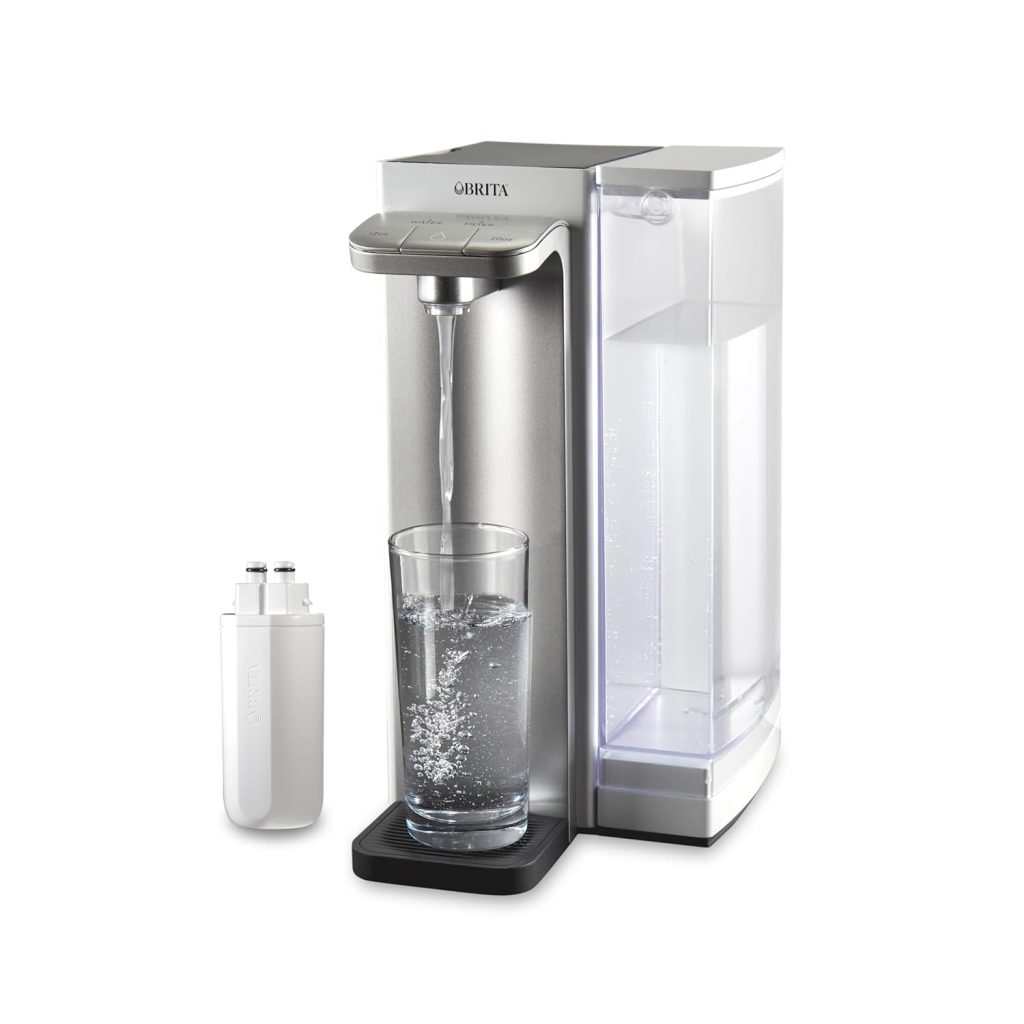
The Brita Hub Instant Powerful Countertop Water Filter is an electric, freestanding filtration system featuring a 12-cup, removable reservoir. It uses carbon block technology to reduce over 70 contaminants, including lead, chlorine, and microplastics, delivering cleaner and better-tasting water.
Best Use Cases
Use this filter for family drinking water at home. It is ideal for kitchens where you want quick access to filtered water without the need for installation. Its push-button dispensing makes it practical for both glasses and large bottles.
Pros
- Reduces more than 70 contaminants, including lead, chlorine, and microplastics.
- Provides Brita’s highest-grade filtration for safer and better-tasting water.
- A large 12-cup reservoir reduces the need for frequent refills.
- Easy plug-in setup, no plumbing or tools required.
- The filter lasts 6 months or up to 120 gallons, reducing the frequency of replacement.
- Push-button dispensing with preset fill sizes (12 oz, 20 oz) and manual mode.
- Helps replace up to 1800 plastic bottles per year, lowering waste.
- Fits bottles and glasses up to 12 inches tall.
Cons
- Requires electricity, limiting portability.
- Higher upfront price compared to pitchers.
- Replacement filters sold separately.
- Bulkier than pitchers, takes counter space.
Lifesaver Jerrycan Water Purifier
Price: $261.40
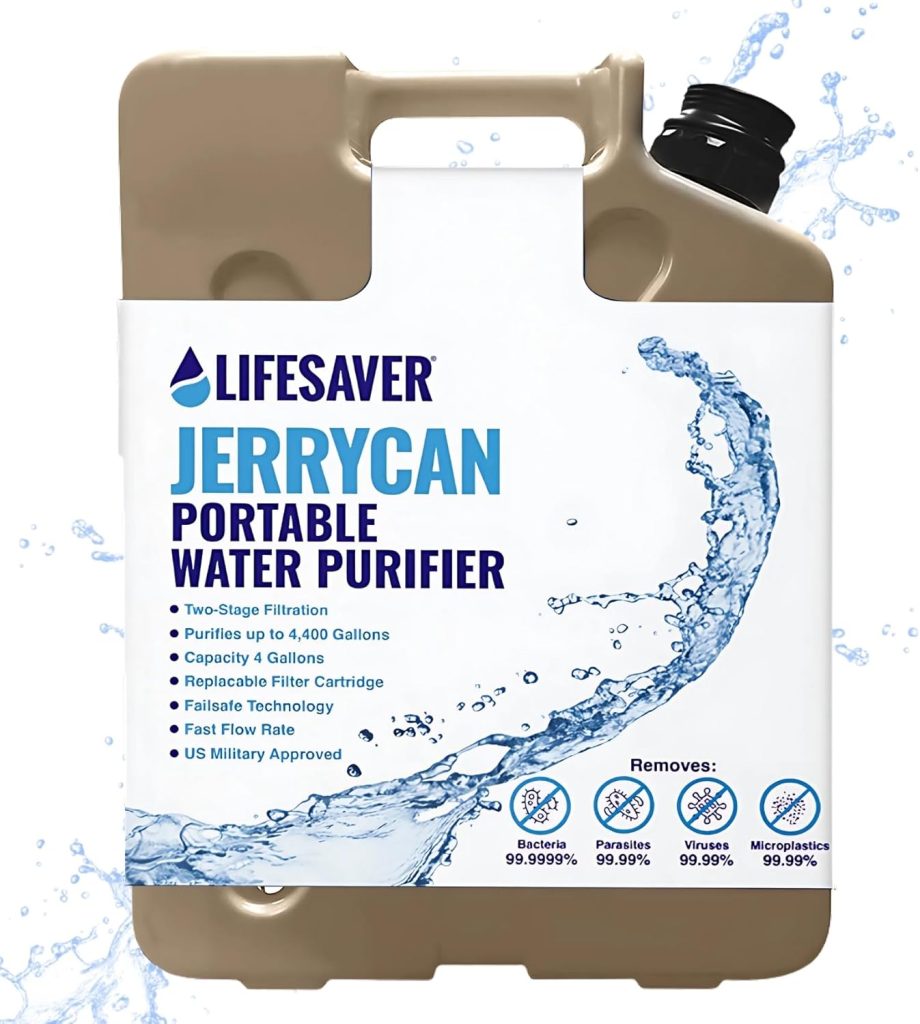
The Lifesaver Jerrycan water purifier is a heavy-duty, military-spec water purifier designed for survival, camping, overlanding, and emergency use. It uses mechanical filtration and an activated carbon filter to remove viruses, bacteria, cysts, parasites, and chlorine taste from up to 18.5 liters of stored water.
Best Use Cases
Use this purifier for off-grid survival, camping trips, overlanding expeditions, and emergency preparedness. Its large 18.5-liter capacity makes it suitable for families, groups, and long-term outdoor use.
Pros
- Meets NSF P248 military-grade standards for water purification.
- Removes 99.9 percent of viruses, bacteria, cysts, and parasites.
- Large 18.5-liter capacity for group or family use.
- The pump-action system provides up to 4 liters of clean water per minute.
- Built-in activated carbon filters improve taste and remove chlorine and odors.
- Automatic failsafe indicator alerts you when the filter needs replacement.
- Simple operation: fill, pump, and drink without electricity.
- Durable build suited for tough outdoor conditions.
Cons
- Heavier than smaller portable filters (4.35 kg when empty).
- Higher upfront price compared to compact filters.
- Requires manual pumping, which may be tiring for continuous use.
- Replacement filters must be purchased separately.
Travel Reverse Osmosis System Countertop Water Filter
Price: $219.00
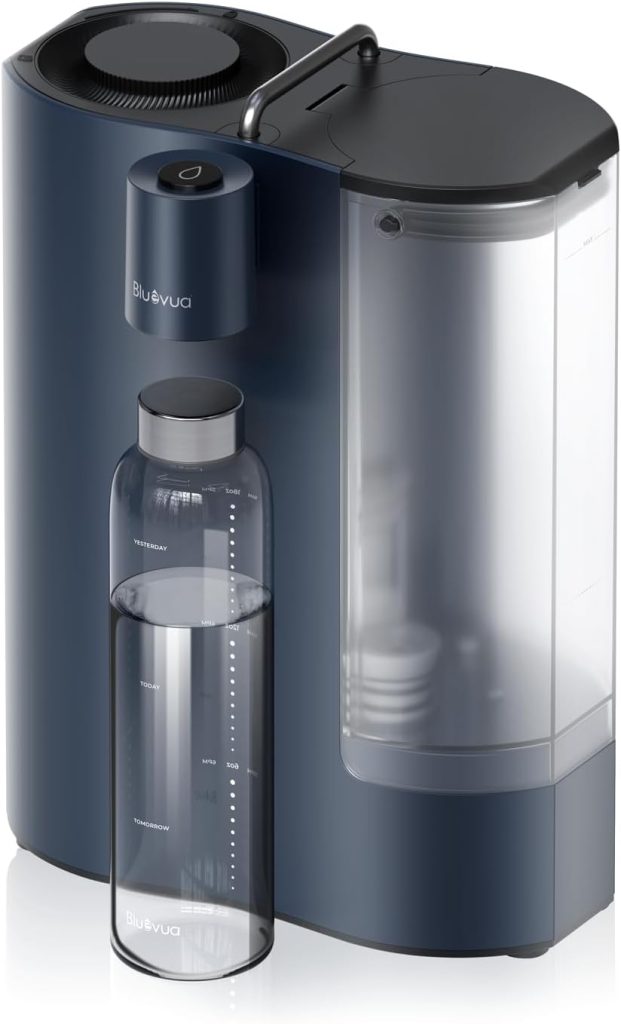
The Bluevua RO100ROPOT-Travel Reverse Osmosis System is a compact 6-stage reverse osmosis water purifier with UV filtration. It reduces contaminants, including TDS, PFOA, PFOS, chlorine, fluoride, arsenic, and lead, delivering safe water in a portable countertop design.
Best Use Cases
Use this purifier in apartments, dorms, offices, or on the go for travel. It is ideal for renters and small households that want high-quality, purified water without the need for plumbing installation. Its compact size makes it easy to carry on trips.
Pros
- 6-stage filtration with reverse osmosis and UV technology for advanced removal of contaminants.
- Certified by SGS and WQA for tested safety and performance.
- 0.0001 μm pore size filters harmful particles with high efficiency.
- Eco-friendly design with an included borosilicate glass bottle to cut plastic waste.
- Efficient 3:1 filtered-to-waste ratio, more sustainable than traditional RO units.
- Compact 10x5x13.5-inch size with stainless steel handle for portability.
- Plug-and-play setup, no plumbing required.
- Self-cleaning function and filter lifespan alert for easy maintenance.
- The twist-and-lock filter design enables quick replacement in just seconds.
Cons
- Requires electricity to operate.
- Produces only 18 oz per cycle, limiting capacity for larger families.
- Higher upfront cost compared to standard countertop filters.
- Wastewater is still produced, though less than traditional RO systems.
Countertop Reverse Osmosis System
Price: $245.99
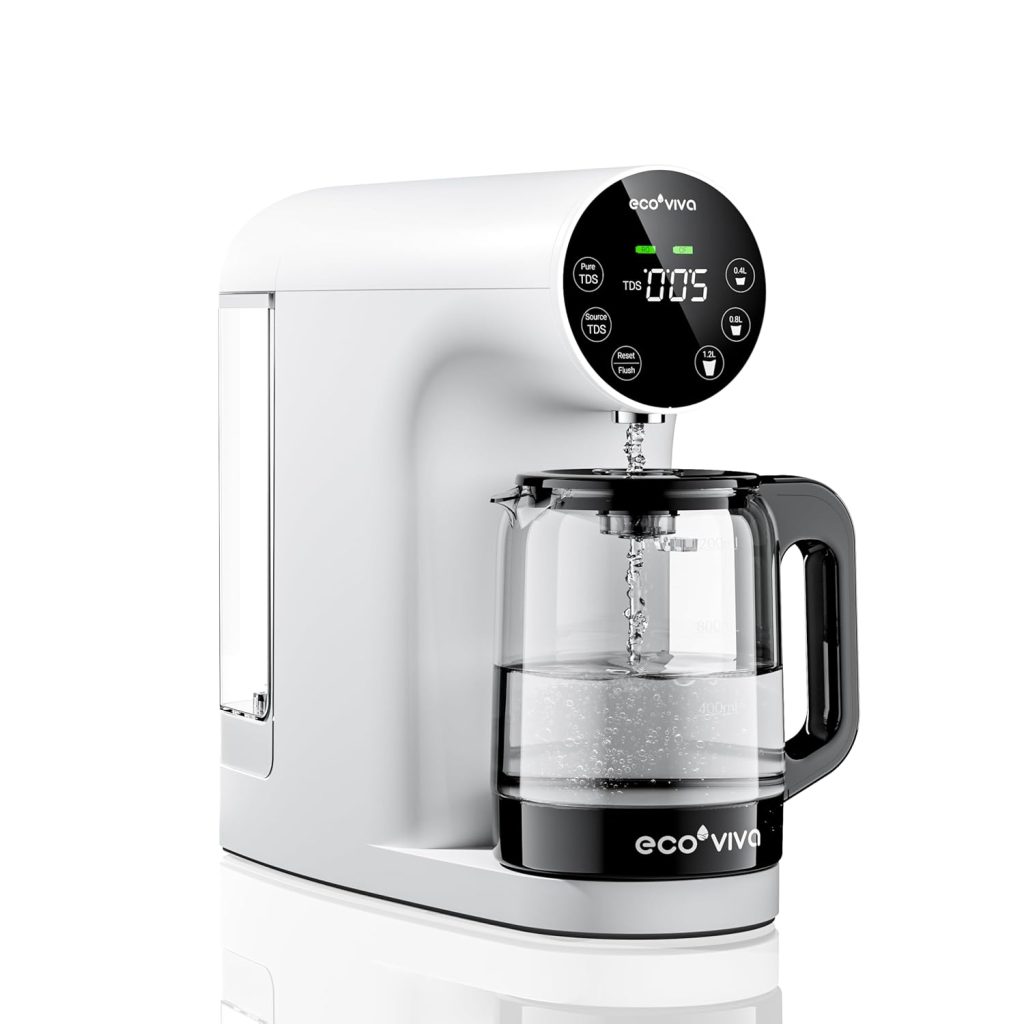
Ecoviva Countertop Reverse Osmosis Water Filter is a 6-stage reverse osmosis countertop water filter with a precision 0.0001 μm RO membrane and real-time TDS display. It reduces contaminants to meet NSF/ANSI 58 and SGS-tested standards, providing safe water in a portable design with a high-quality glass carafe.
Best Use Cases
Use this purifier for apartments, offices, or RVs where you need high-quality drinking water without the need for plumbing installation. Its glass carafe design makes it practical for everyday family use and avoids the risk of plastic contamination.
Pros
- 6-stage filtration system meeting NSF/ANSI 58 and SGS standards.
- 0.0001 μm RO membrane reduces TDS for safer, cleaner water.
- Portable countertop design, no plumbing required.
- Includes a high-borosilicate glass carafe for enhanced water safety.
- One-touch LED panel with real-time TDS display and filter life alerts.
- Filters last up to 12 months, reducing the need for frequent replacements.
- A 3:1 pure-to-drain ratio conserves water and allows for the reuse of wastewater.
- Built with BPA-free food-grade plastic and borosilicate glass materials.
- Backed by 2 years of after-sales service and customer support.
Cons
- Requires electricity to operate.
- Limited flow rate (0.42 liters per minute).
- Higher upfront price compared to simpler countertop filters.
- A glass carafe reduces portability for travel use.
Waken Electric C11S Reverse Osmosis Water Filtration System
Price: $169.99
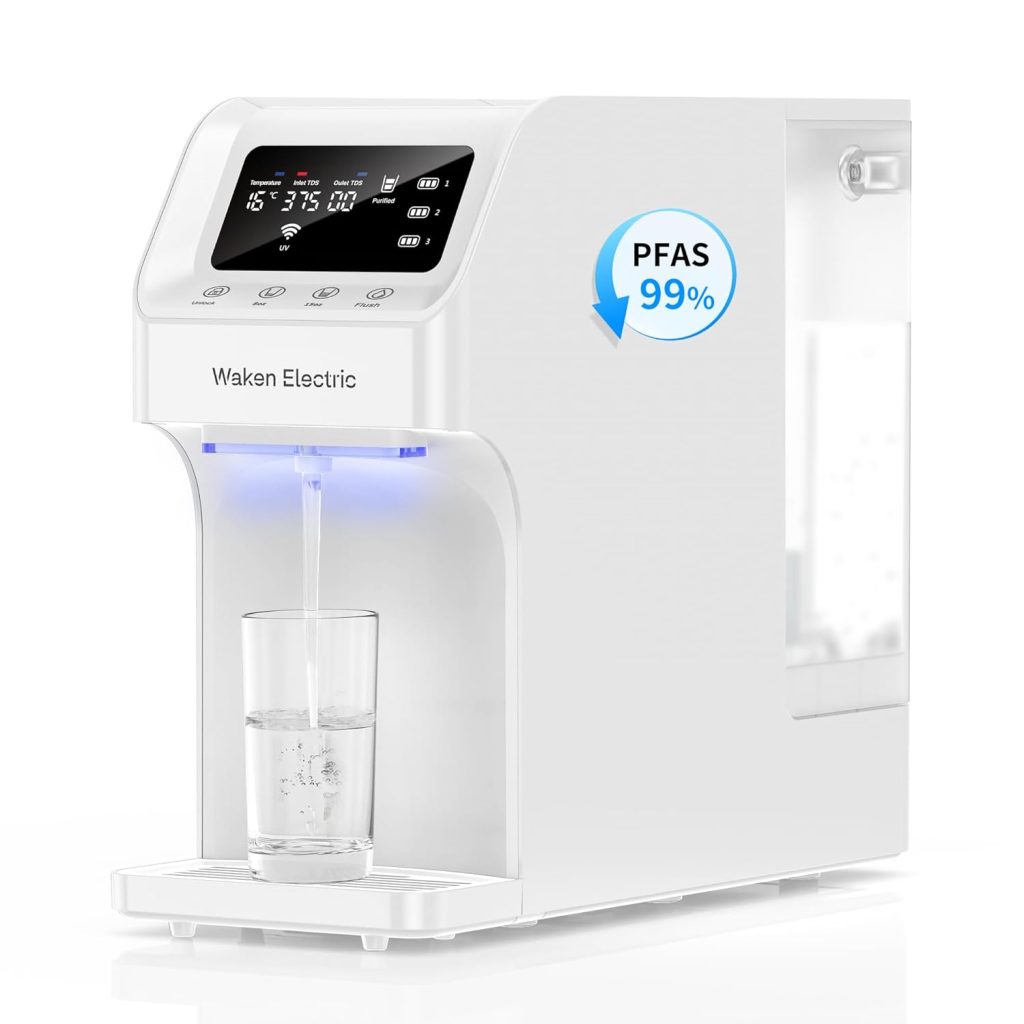
The Waken Electric C11S Reverse Osmosis Water Filtration System is an 8-stage countertop reverse osmosis water filtration system with UV purification and advanced multi-filtration recycling. It delivers a 4:1 pure-to-drain ratio, produces up to 418 gallons per day, and requires no installation.
Best Use Cases
This system is suitable for apartments, condos, and RVs that require high-capacity daily water usage. It is ideal for families who want rapid dispensing, advanced purification, and real-time water quality monitoring in a plug-and-play design.
Pros
- 8-stage filtration with UV and coconut shell activated carbon for advanced purification.
- 4:1 pure-to-drain ratio, highly efficient water utilization.
- Dispenses up to 418 gallons per day with a fast 14-second cup fill.
- Smart display with TDS monitoring, filter life tracking, and waste reminders.
- Tracks usage separately for PAC, RO, and CF filters.
- Wastewater reminder prevents secondary contamination.
- No plumbing required, simple plug-in operation.
- Certified to NSF/ANSI 58, 372, and EPA 200 by SGS, plus FCC certification.
- Large 200 oz (528 gallons) capacity tank for extended use.
Cons
- Requires electricity to operate.
- A larger size (18.3 inches wide) may not fit smaller countertops.
- Produces wastewater that requires regular emptying.
- More filters to maintain compared to simpler systems.
How to Evaluate the Effectiveness of a Water Filter?
Evaluating the effectiveness of a water filter involves checking how well it removes contaminants and delivers safe, clean water for daily use. Effectiveness testing is important because it confirms health protection, ensures product reliability, and verifies compliance with recognized safety standards. A proper evaluation helps households avoid poor-quality filters, unnecessary expenses, and health risks linked to unsafe water.
The key steps to evaluate the effectiveness of a water filter are:
- Lab water testing
Testing your water before and after filtration shows which contaminants the system removes. This provides direct evidence of filter performance and ensures the filter matches your water quality needs.
- Check certifications
Look for NSF, ANSI, or similar certifications on the product. These independent marks confirm that the filter has been tested under strict standards and is safe for consumer use.
- Filter lifespan
Review how long the filter lasts before replacement. A shorter lifespan increases maintenance costs, while a longer-lasting filter ensures consistent performance and better long-term value.
- Performance reports
Check manufacturer data and independent lab reports. These documents verify removal rates for specific contaminants and prove whether the filter works as advertised.
An effective water filter consistently removes harmful substances, maintains performance throughout its lifespan, and is supported by credible certifications and test results. This ensures safety, reliability, and long-term value.
How can I test if my water filter is working properly?
You can test if your water filter is working properly by using TDS meters, chlorine kits, or certified lab analysis. These tools confirm contaminant removal, while taste or visual checks alone cannot provide accurate performance verification.
Is chlorine completely removed by standard water filters?
No, chlorine is not completely removed by standard water filters. Activated carbon and reverse osmosis filters reduce chlorine significantly. Results depend on filter type, certification, and maintenance. Testing water with chlorine kits confirms whether safe removal levels are achieved.
Do water treatment systems remove microplastics?
Yes, water treatment systems remove microplastics when using reverse osmosis or nano-filtration membranes with extremely fine pore sizes. Basic carbon filters cannot capture them. Certification and third-party testing confirm whether a system achieves reliable microplastic reduction for safe drinking water.
How much power do home water filtration systems use?
Some of the best portable water filter options are lightweight devices that make unsafe water safe to drink. They help travelers, campers, and households during emergencies by removing harmful contaminants and ensuring access to clean water anywhere.
Are all home water filters energy-efficient?
No, not all home filters are energy-efficient. Countertop and gravity-fed systems usually require no power. Reverse osmosis and UV systems consume more energy. Power ratings, pure-to-drain ratios, and certification on actual consumption performance measure efficiency.
How do I pick the right water filter for my needs?
You can pick the right water filter by testing your water for contaminants and then matching the results with certified systems. Consider flow capacity, filter lifespan, and maintenance costs. No single filter suits all conditions, so knowing how to choose the right water filter in 2025 ensures you select a system that delivers safe and effective results.
Can I use a water filtration bottle to filter water for my home?
No, a water filtration bottle cannot filter water for your home because it is designed to handle only small volumes of water. It is useful during travel or emergencies, and options like the Best Brita Water Filter Bottle provide safe hydration on the go, but households require larger systems with higher flow capacity and certified filtration for reliable use.
How do I know if my water filter is improving the taste of my water?
You will know if your water filter is improving the taste of your water if the chlorine smell, metallic aftertaste, or earthy notes reduce noticeably. Taste alone is not a full measure, so confirm improvements with TDS meters or certified water testing kits for accurate evaluation.
Can water filtration fix cloudy water?
Yes, water filtration fixes cloudy water by using sediment filters and reverse osmosis to remove suspended particles that cause turbidity. No, carbon filters alone may not be effective. Testing turbidity before and after confirms performance.
Can water filters protect appliances from damage?
Water filters protect appliances from damage by reducing sediment, chlorine, and minerals that can damage kettles and dishwashers. However, not all filters are effective in preventing scaling. Whole-house softeners or RO units provide stronger protection against hardness and mineral buildup.

